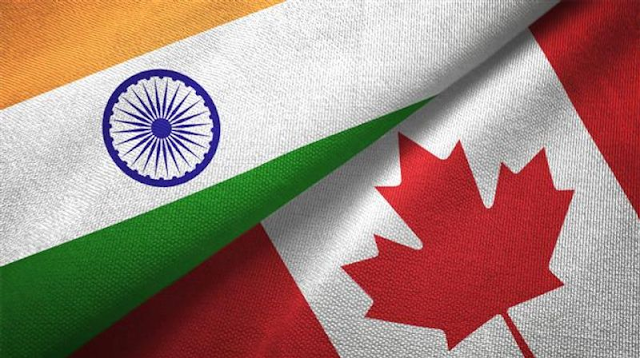India-Canada relations have reached a historic low, as India has taken a significant step by recalling its High Commissioner to Canada, Sanjay Kumar Verma, along with several other diplomats. This decision follows the Canadian government’s recent move to name Indian diplomats, including the High Commissioner, as “persons of interest” in the ongoing investigation into the killing of Hardeep Singh Nijjar. This development has escalated tensions between the two nations, with both sides taking firm stances.
Background of the Diplomatic Fallout
The rift between India and Canada started in June 2023, when Nijjar, a prominent Sikh separatist leader, was murdered. Canada has claimed that it has “credible and irrefutable evidence” implicating Indian agents in the killing, which has fueled further diplomatic strain. Despite repeated demands from India for proof, the Canadian government is yet to make this evidence public. This situation has worsened already fragile relations, as India sees this accusation as a serious affront to its diplomatic integrity.
#WATCH | Delhi: Canadian Chargé d’Affaires Stewart Wheeler leaves from the MEA.
He says, “…Canada has provided credible, irrefutable evidence of ties between agents of the Government of India and the murder of a Canadian citizen on Canadian soil. Now, it is time for India to… pic.twitter.com/RdOXRpoTg6
— ANI (@ANI) October 14, 2024
In response, India has made it clear that it has no trust in Canada’s investigation and, in a decisive move, has recalled its High Commissioner from Ottawa. This unprecedented step marks a critical turning point in India-Canada relations, with fears of further deterioration looming large.
We received a diplomatic communication from Canada yesterday suggesting that the Indian High Commissioner and other diplomats are ‘persons of interest’ in a matter related to an investigation in that country. The Government of India strongly rejects these preposterous imputations… pic.twitter.com/hRo0RAf13q
— ANI (@ANI) October 14, 2024
The Government of India has decided to expel the following 6 Canadian Diplomats: Stewart Ross Wheeler, Acting High Commissioner, Patrick Hebert, Deputy High Commissioner, Marie Catherine Joly, First Secretary, lan Ross David Trites, First Secretary, Adam James Chuipka, First… pic.twitter.com/bdaRf1i0H4
— ANI (@ANI) October 14, 2024
We received a diplomatic communication from Canada yesterday suggesting that the Indian High Commissioner and other diplomats are ‘persons of interest’ in a matter related to an investigation in that country. The Government of India strongly rejects these preposterous imputations… pic.twitter.com/hRo0RAf13q
— ANI (@ANI) October 14, 2024
The Government of India has decided to expel the following 6 Canadian Diplomats: Stewart Ross Wheeler, Acting High Commissioner, Patrick Hebert, Deputy High Commissioner, Marie Catherine Joly, First Secretary, lan Ross David Trites, First Secretary, Adam James Chuipka, First… pic.twitter.com/bdaRf1i0H4
— ANI (@ANI) October 14, 2024
Canada’s Political Angle
Canadian Prime Minister Justin Trudeau is under immense political pressure as the country heads towards elections. Many analysts believe that Trudeau is using this diplomatic dispute to project himself as a strong leader standing up to India, appealing to voters who may be concerned about national security. However, critics argue that this approach could backfire, not just for Canada’s relationship with India, but also with other global partners like the United States.
India’s withdrawal of its High Commissioner is being seen as a major geopolitical move, especially given that Canada will host the G7 Summit in 2025. Experts suggest that India might consider skipping the event, adding more pressure on Trudeau’s administration.
#BREAKING: India has decided to withdraw the Indian High Commissioner to Canada and other targeted diplomats and officials. India reserves the right to take further steps in response to the Trudeau Government’s support for extremism, violence and separatism against India. pic.twitter.com/00ZvrbVHfS
— Aditya Raj Kaul (@AdityaRajKaul) October 14, 2024
Western Media’s Narrative
Western media outlets, such as The Washington Post, have reported that Canada ordered six Indian diplomats to leave the country. However, Indian officials have denied this, stating that the decision to recall the diplomats was made solely by India. This misrepresentation has added fuel to the fire, and India’s concerns about how the situation is being portrayed globally are growing.
The Indian government has officially stated that it has lost faith in the safety of its diplomats in Canada, citing the rise of extremism and violence against Indian officials. Videos circulating on social media show disturbing scenes of protests by Khalistani separatists in Canada, where effigies of Indian diplomats were burned, and their photos were fired upon.
#BREAKING: Canadian Khalistani Terror Group SFJ issues fresh threat against Indian High Commissioner to Canada Sanjay Kumar Verma, releases video of his photo being pumped with bullets. Canadian Govt fails to act, refusing to investigate or act against the Khalistani terrorists. pic.twitter.com/GTJEfYsEWZ
— Aditya Raj Kaul (@AdityaRajKaul) October 14, 2024
The Road Ahead
With both countries taking a hard line, the future of India-Canada relations remains uncertain. The situation could have far-reaching implications, not just for bilateral ties but also for international diplomacy. Many Western countries, particularly the U.S., will likely be concerned about the impact this rift could have on their own relations with both nations, especially given India’s growing global influence.
As the story continues to unfold, one thing is clear: the road to mending India-Canada relations will be long and fraught with challenges.
Conclusion
This diplomatic fallout is not just about allegations or investigations—it’s about the broader geopolitical implications of a strained relationship between two important nations. With elections looming in Canada and India taking a firm stand, the global community will be closely watching how this crisis evolves.
What are your thoughts on this situation? Do you think India made the right decision by recalling its High Commissioner? Share your views in the comments below.


